Airbus Eurocopter EC135 Samu 38 Model
Production Time 9 to 10 weeks
Shipment is by FedEx, UPS or DHL International Express Courier with a normal door-to-door delivery time worldwide of within 2-3 business days after dispatch. Due to the current volatility of world fuel prices, the amount mentioned here is our best estimate for DHL and UPS and may be subject to change at the time of shipping.

Product statistics
Length: 16 Inches (40.6 Centimeters)Rotor Diameter: 13.4 Inches (34 Centimeters)
Height: 4.6 Inches (11.7 Centimeters)
Scale: 1:30
$239.50
Manufacturer: Airbus Eurocopter
Production Time 9 to 10 weeks
-
United States dollar ($)
-
Pound sterling (£)
-
Euro (€)
-
Australian dollar ($)
-
Canadian dollar ($)
-
Singapore dollar ($)
-
Swiss franc (CHF)
-
Japanese yen (¥)
-
Danish krone (kr.)
-
Hong Kong dollar ($)
-
Norwegian krone (kr)
-
Swedish krona (kr)
General Product Description
Our ReplicaHangar Airbus Eurocopter EC135 Samu 38 Model exhibits unique, unrivaled quality and detailed design to come as close as possible to the accuracy of the actual aircraft. It comes as standard with a robust, durable base or stand which is available in a variety of different finishes designed to match your own personal requirements including solid wood, wood with polished metal supports or adjustable wood wall mount and will be ready within about 9-10 weeks from placement of order.
The Airbus Eurocopter EC135 Samu 38 Model is made of the finest kiln dried renewable mahogany wood (commonly known as Lauan or Meranti) which has undergone many stages of carving and meticulous and careful sanding giving the beautiful, finished museum quality masterpiece. Many collectors and model connoisseurs demonstrate their preference for genuine handmade and hand painted mahogany wood models rather than plastic or die cast (diecast) alternatives due to the overall look and totally different feel of the item - we trust you will find the same. We can however, if required produce the same model in Solid Cast Resin so just click and contact us for further information. Our craftsmen and gifted artisans ensure that our finely handcrafted model airplanes match the precise blueprint details of the original aircraft. The paint scheme, markings and parts are closely matched, reflecting the original aircraft. This stylish top-quality desktop replica model will surely enthrall anyone who receives this as a gift and for sure one of the most appropriate and desirably collectable gifts for any aviation enthusiast and avid helicopter model collector whilst also displaying a perfect resemblance to the actual real life heli.
If you require, we can also make the Airbus Eurocopter EC135 Samu 38 Model in any other airline, private livery or colour scheme you require and if necessary, in a different size or scale. Just click here to contact us with a description or photographs of what you require, and we will let you have a quotation for the necessary customization by return email. We can also make bespoke scale replicas of any other private / civil commercial airliner or airliners, helicopter, glider, gliders with engines, military jet, warplane jets, propeller warplanes, biplane, triplane, tail fin, spacecraft, rocket or NASA model you require in any airline, military or civilian livery or colors. We also produce model airships, blimp, dirigible, blimps, boat and ship collectibles. Wall plaque or seal for military, government or private customers. Again, by clicking here to contact us just let us know exactly what you need.
The EC135 can trace its history back to before the formation of Eurocopter. It was started as the +BO 108+. by MBB of Germany in the mid-eighties. A technology demonstrator (V1) flew for the first time on 17 October 1988, powered by two Allison 250-C20R/1 engines. A second BO 108 (V2) followed on 5th June 1991, this time with two Turbom eacute;ca +TM319-1B Arrius+. engines. Both these machines had a conventional tail rotor.
In late 1992, the design was revised with the introduction of the +Fenestron+. tail rotor system, reflecting the creation of Eurocopter that year through the merger of +MBB+. and A eacute;rospatiale. In contrast to other helicopters, the tail rotor blades have been integrated into the tailboom and as they are framed by the tailboom, the risk of an accident has been significantly reduced. This tail rotor system, combined with the fuselages roomy dimensions, means that the EC135 aircraft has become popular with aeromedical helicopter operators. The EC135 is the best selling light twin of the the past 10 years.
Two pre-production prototypes were built. They flew on 15 February and 16 April 1994, testing the Arrius 2B and Prattamp; Whitney Canada PW206B engines, the older and less powerful Allison Model 250 powerplant having been rejected. A third helicopter followed on 28 November 1994.
The EC135 made its US debut at the Heli-Expo in January 1995 at Las Vegas. After over 1,600 flight hours, European JAA certification was achieved on 16 June 1996, with FAA approval following on 31 July. Deliveries started on 1st August, when two helicopters (0005 and 0006) were handed over to Deutsche Rettungsflugwacht. The 100th EC135 was handed over to the Bavarian police force in June 1999. By that time the worldwide fleet had clocked up around 30,000 flight hours. As of 2008, the fleet total stood at over 1 million flight hours, with over 650 aircraft delivered.
Single-pilot IFR (SPIFR) certification was granted by the German LBA on December 2, 1999. Deliveries to the German Aviators Corps began on 13 September 2000 at the German Army Aviators School at (B uuml;ckeburg Air Base) near Achum. The EC135 received SPIFR certification from the UK CAA in December 2000.
In autumn 2000, Eurocopter announced the start of certification work for the Prattamp; Whitney Canada PW206B2, a version of the PW207 which offers improved single-engine performance and 30 second emergency power. The LBA certification was achieved on 10 July 2001, and the first EC135 with the new engines was handed over to the Swedish National Police on 10 August 2001.
The world fleet leader in aircraft hours for this type is G-NESV (s/n 0067). This aircraft was delivered to the North East Air Support Unit in April 1999 and on 29th March 2007 it clocked up its 9,000th hour.
At the NBAA in March 2007 in Atlanta, Eurocopter unveiledlsquo;LH eacute;licopt egrave;re par Herm egrave;s, a special-edition VIP model designed by Herm egrave;s International, S.A.. This variant features a specially-created luxury four-place main cabin, a sliding glass partition, a corporate baggage hold, redesigned skid landing gear and other external changes. Launch customer forlsquo;LH eacute;licopt egrave;re par Herm egrave;s is Falcon Aviation Services (FAS), based in Abu Dhabi, United Arab Emirates.
+EC135 P1+.
Powered by two 463 kW (621 shp) Prattamp; Whitney Canada PW206B. Later versions have the Center Panel Display System (CPDS). Initial maximum take-off weight (M.T.O.W.) of 2,631 kg (5,800 lbs), later raised to 2,721 kg (6,000 lbs) and then 2,835 kg (6,250 lbs).
+EC135 T1+.
Powered by two 435 kW (583 shp) Turbomeca Arrius 2B1/2B1A/2B1A1. Later versions have the CPDS. Initial M.T.O.W. of 2,631 kg (5,800 lbs), later raised to 2,721 kg (6,000 lbs) and then 2,835 kg (6,250 lbs).
+EC135 P2+.
Powered by two 463 kW (621 shp) Prattamp; Whitney Canada PW206B2. Increased thermodynamic and mechanic OEI ratings (128% OEI torque). Replaced EC135 P1 in production in August 2001.
+EC135 T2+.
Powered by two 452 kW (652 shp) Turbomeca Arrius 2B2. Increased thermodynamic and mechanic OEI ratings (128% OEI torque). Replaced EC135 T1 in production in August 2002.
+EC135 P2++.
Latest production version with 498 kW (667 shp) PW206B2 (new power ratings based on a FADEC software upgrade), plus a 2,910 kg (6,415 lbs) M.T.O.W. upgrade, extended component time between overhaul (TBOs), and a change in the main transmission lubricating oil.. Built in Germany and Spain.
+EC135 T2++.
Latest production version with 473 kW (634 shp) Arrius 2B2 engines (new power ratings based on a FADEC software upgrade), plus a 2,910 kg (6,415 lbs) M.T.O.W. upgrade, extended component TBOs, and a change in the main transmission lubricating oil. Built in Germany and Spain.
+EC135 P2i+.
Marketing designation of aircraft upgraded to (rather than built to) EC135 P2+ standard.
+EC135 T2i+.
Marketing designation of aircraft upgraded to (rather than built to) EC135 T2+ standard.
+EC 635
Military variant operated by Jordan.
Courtesy Wikipedia
| Weight | 4 kg |
|---|---|
| Dimensions | 16 × 13.4 × 4.6 in |
Be the first to review “Airbus Eurocopter EC135 Samu 38 Model” Cancel reply
Related products
Helicopters
Helicopters

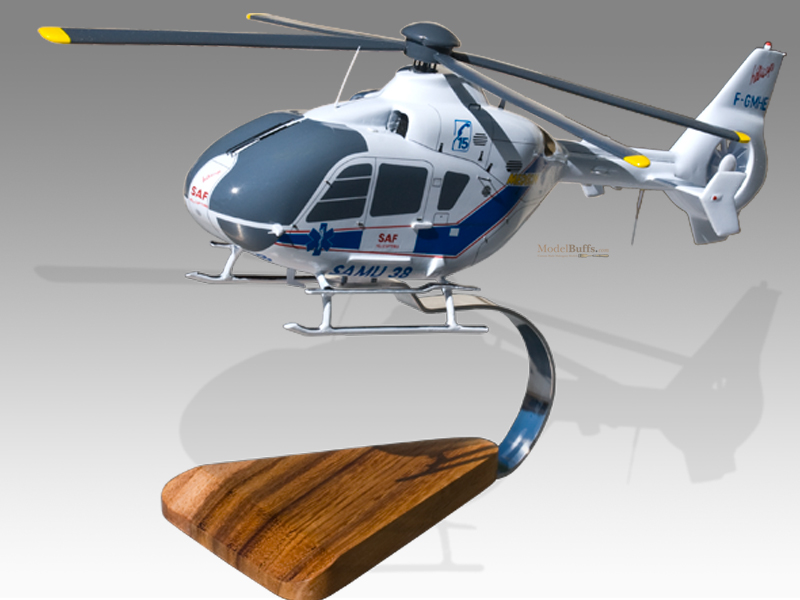
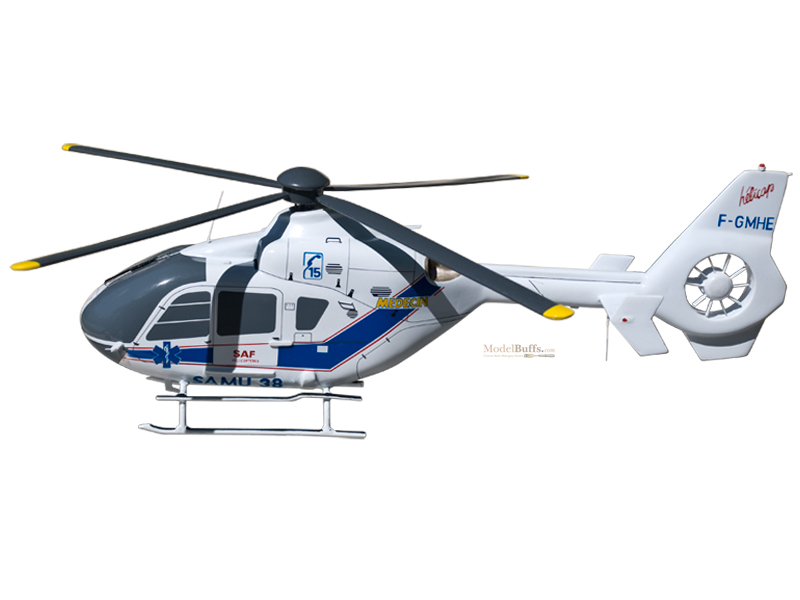
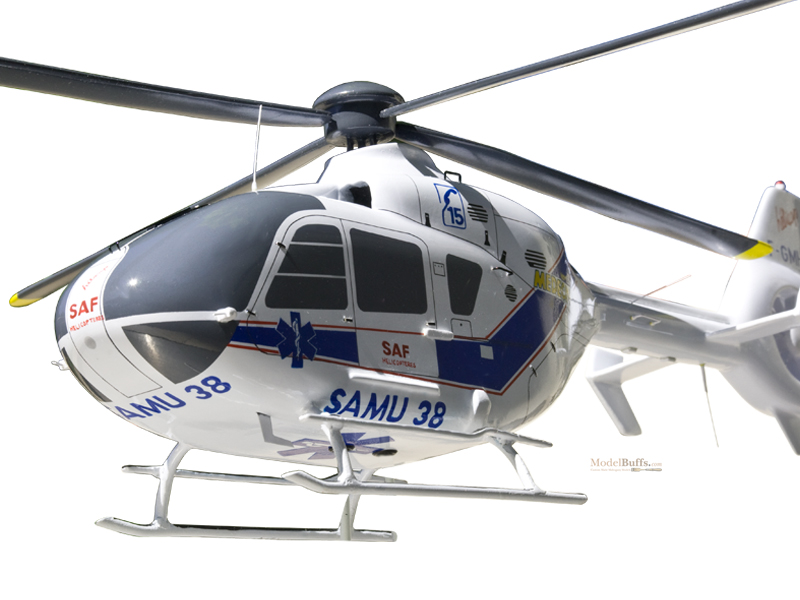
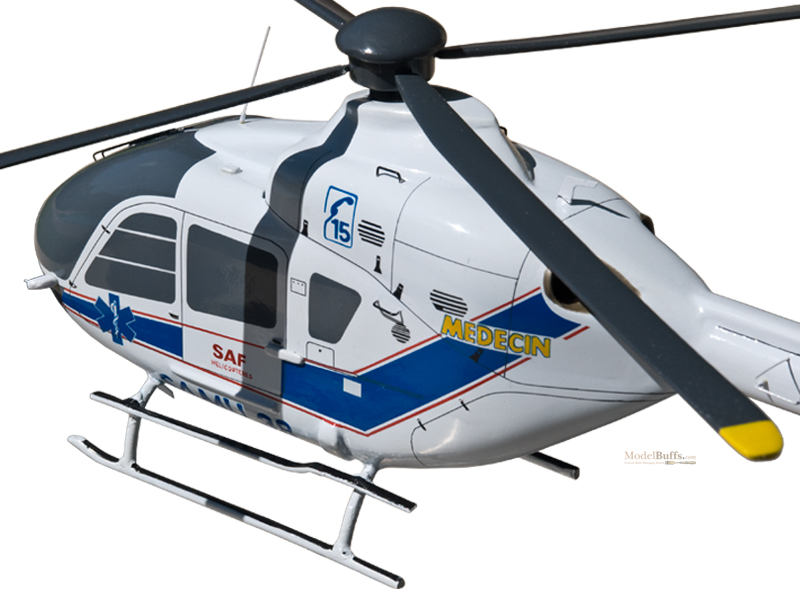
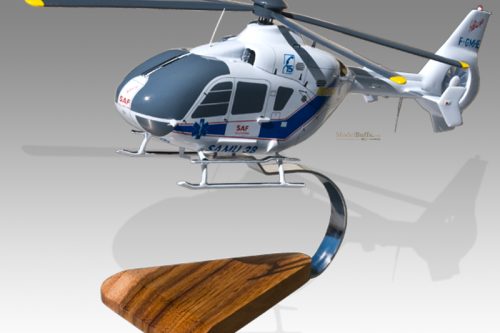
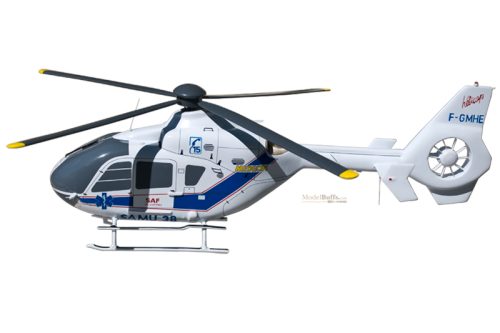
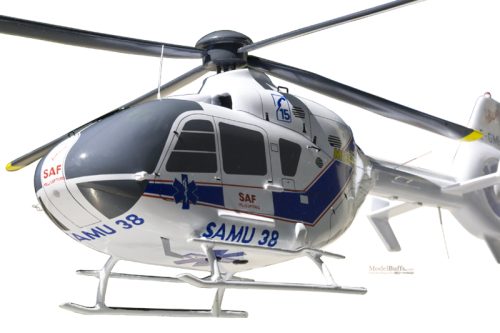
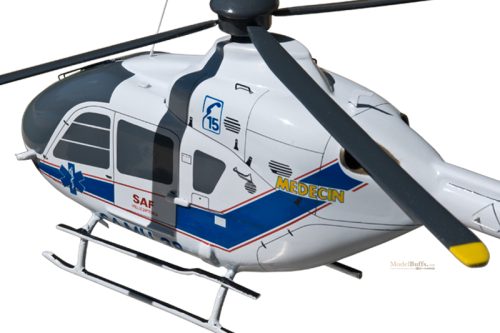
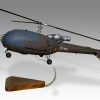
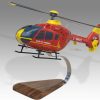
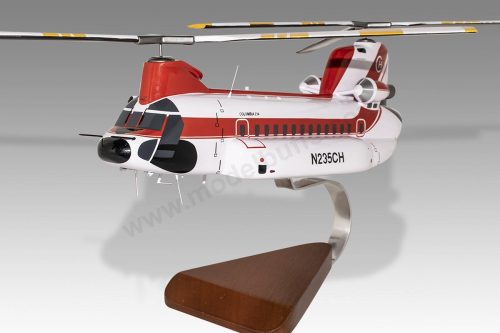
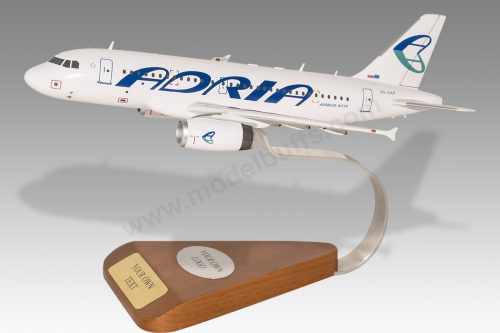
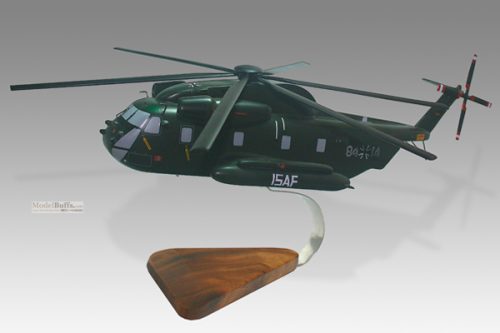
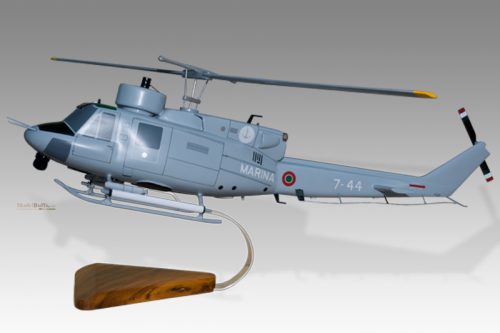
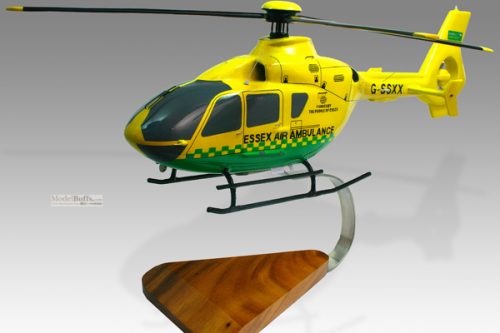
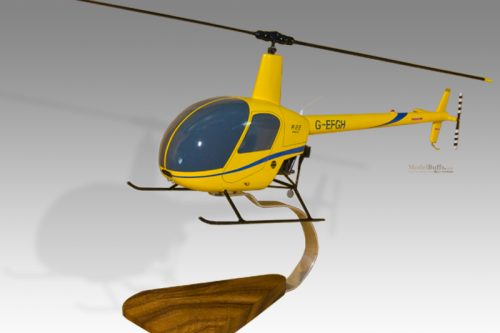
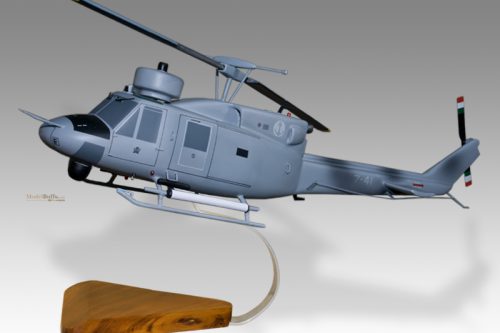

Reviews
There are no reviews yet.